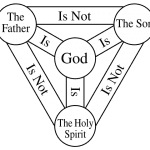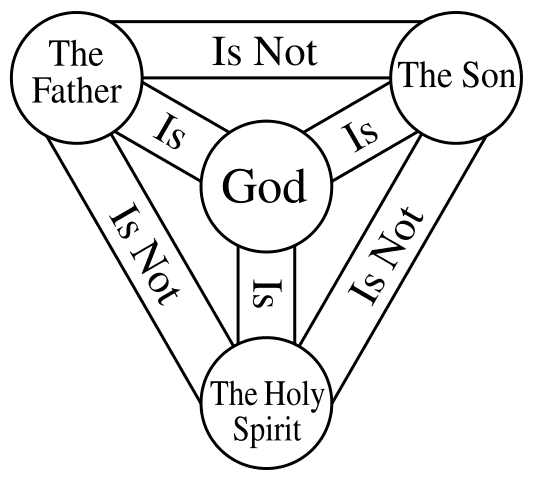
I am responding to many portions of the article, “New Testament Contradictions” by Paul Carlson (The Secular Web, 1995). His words will be in blue. The numbers in red are my own (for numbering the alleged “contradictions” that I reply to).
*****
Editor’s note: As with all lists of alleged biblical contradictions, there will be disagreement in at least some specific cases as to whether a given “contradiction” is a genuine contradiction. It is therefore up to the reader to decide for him/herself whether to accept that a listed “contradiction” is, in fact, a genuine contradiction.
I agree that sometimes reasonable folks can disagree about the presence of a contradiction in some complex cases. But reasonable folks ought also never bring up an alleged “contradiction” that is clearly not a contradiction by any stretch of the imagination, according to the well-established rules of logic. Many such faux– / pseudo-“contradictions” are present in any atheist “laundry list” of proposed biblical contradictions that I have ever seen, including this present one. Shame on those who promulgate them. It’s weak, shoddy thinking, period.
1) I. THE BIRTH OF JESUS
A. THE GENEALOGIES OF JOSEPH
Matthew and Luke disagree
Matthew and Luke give two contradictory genealogies for Joseph (Matthew 1:2-17 and Luke 3:23-38). They cannot even agree on who the father of Joseph was. Church apologists try to eliminate this discrepancy by suggesting that the genealogy in Luke is actually Mary’s, even though Luke says explicitly that it is Joseph’s genealogy (Luke 3:23). Christians have had problems reconciling the two genealogies since at least the early fourth century.
See:
Reply to Atheist Jonathan MS Pearce: “Contradictory” Genealogies of Christ? [7-27-17]
Are the Two Genealogies of Christ Contradictory? [National Catholic Register, 1-5-19]
2) Why do only Matthew and Luke know of the virgin birth?
Of all the writers of the New Testament, only Matthew and Luke mention the virgin birth. Had something as miraculous as the virgin birth actually occurred, one would expect that Mark and John would have at least mentioned it in their efforts to convince the world that Jesus was who they were claiming him to be.
Arguments from “expectation” or plausibility are not, strictly speaking, the same as establishing a logical contradiction. This is the argument from silence, too, which is always weak in and of itself. Two Gospels mentioning it is more than enough. The other two didn’t. But who cares? Why must all four mention any particular thing? They all have to do with Jesus and His life. That is what anyone should “expect” to see in them. Details and absences and inclusions can differ in innumerable ways.
3) The apostle Paul never mentions the virgin birth, even though it would have strengthened his arguments in several places. Instead, where Paul does refer to Jesus’ birth, he says that Jesus “was born of the seed of David” (Romans 1:3) and was “born of a woman,” not a virgin (Galatians 4:4).
J. Warner Wallace answers:
We need to be very careful about drawing conclusions from silence. Paul may not have mentioned the virgin conception simply because it was widely understood or assumed. Paul may also have been silent because it was not the focus or purpose of his letters (which are often devoted to issues related to the Church). Remember that Paul was a contemporary of Luke (who was one of the two authors who wrote extensively about the conception of Jesus). Paul appears to be very familiar with Luke’s’ gospel (he quotes Luke in 1 Timothy 5:17-18 and 1 Corinthians 11:23-26). (“Why Didn’t Paul Mention The Virgin Conception?”, Cold-Case Christianity, 12-14-18)
As to the two Pauline passages mentioned, see this same excellent article for a reply.
4) Why did Matthew include four women in Joseph’s genealogy?
Matthew mentions four women in the Joseph’s genealogy.
a. Tamar – disguised herself as a harlot to seduce Judah, her father-in-law (Genesis 38:12-19).
b. Rahab – was a harlot who lived in the city of Jericho in Canaan (Joshua 2:1).
c. Ruth – at her mother-in-law Naomi’s request, she came secretly to where Boaz was sleeping and spent the night with him. Later Ruth and Boaz were married (Ruth 3:1-14).
d. Bathsheba – became pregnant by King David while she was still married to Uriah (2 Samuel 11:2-5). . . .
That all four of the women mentioned are guilty of some sort of sexual impropriety cannot be a coincidence. Why would Matthew mention these, and only these, women? The only reason that makes any sense is that Joseph, rather than the Holy Spirit, impregnated Mary prior to their getting married, and that this was known by others who argued that because of this Jesus could not be the Messiah. By mentioning these women in the genealogy Matthew is in effect saying, “The Messiah, who must be a descendant of King David, will have at least four “loose women” in his genealogy, so what difference does one more make?”
Taylor Halverson replies:
Because of Mary, the mother of Jesus.
Mary was an unusual mother. Found to be pregnant before she was married, she could have easily been outcast, thrown into slavery, or executed. She could have lived her life with terrible accusations thrown against her, and according to some ancient traditions, many people did think she was nothing more than an immoral harlot. And if so, such ancient critics reasoned, how could God ever do any good through someone so fallen, so morally compromised?
This is where the four women of Matthew’s genealogy answer the critics: Tamar (daughter-in-law to Judah), Rachab (the Jericho prostitute), Ruth (the non-Israelite Moabite), and Bathsheba (the woman unlawfully taken by David). Not only are each of these women ancestresses to Jesus, but each of them came from unusual, unexpected circumstances or were involved in what appears to be sexually improper situations. (“Why Are Four Women Mentioned in the Genealogy of Matthew 1?”, 1-10-19)
5) To have women mentioned in a genealogy is very unusual.
Not really. Bible scholar Dr. Funlola Olojede comments:
In an essay entitled Observations on women in the genealogies of 1 Chronicles 1-9, [1] Ben Zvi (2006:174-184) already noted that the genealogical section of the book of Chronicles refers to more than fifty different women, whether named or unnamed. [2] The study classifies the women into two categories based on their roles. The first category includes women involved “in lineage roles often associated with female members of an ancient household”. These include the roles of mother-wife (e.g., the daughter of Machir who married Hezron and gave birth to Segub in 1 Chron 2:1); mother-concubine (e.g., Ephah, Caleb’s concubine and the mother of his sons in 1 Chron 2:46); mother-divorcee (e.g., 1 Chron 8:8-11); daughter-in-law-mother (e.g., 1 Chron 2:4), and identity as daughter or sister (e.g., 1 Chron 3:2, 5; 4:18).
The second group consists of “women in roles that were commonly assigned to mature males in the society” (Ben Zvi 2006:184-186). These include women who were heads of families (e.g., Zeruiah and Abigail in 1 Chron 2:16-17), and women who built cities (the only instance in this category was Sheerah). (“Chronicler’s women – a holistic appraisal”, Acta Theologica, January 2013)
6) B. THE ANGEL’S MESSAGE
In Matthew, the angel appears to Joseph in a dream and tells him that Mary’s child will save his people from their sins. In Luke, the angel tells Mary that her son will be great, he will be called the Son of the Most High and will rule on David’s throne forever. A short time later Mary tells Elizabeth that all generations will consider her (Mary) blessed because of the child that will be born to her.
It’s simply two different messages, to two people for two different reasons. There is no “requirement” that they be exactly the same.
7) If this were true, Mary and Joseph should have had the highest regard for their son. Instead, we read in Mark 3:20-21 that Jesus’ family tried to take custody of him because they thought he had lost his mind.
This is untrue. As I have pointed out, the family was trying to rescue Jesus from the people claiming that he had lost his mind. See:
Mark 3:21-22 (RSV, as throughout) And when his family heard it, they went out to seize him, for people were saying, “He is beside himself.” [22] And the scribes who came down from Jerusalem said, “He is possessed by Be-el’zebul, and by the prince of demons he casts out the demons.” (cf. Jn 10:20-21)
For further reading, see:
Jesus’ “Brothers” Were “Unbelievers”? (Jason also claims that “Mary believed in Jesus,” but wavered, and had a “sort of inconsistent faith”) (vs. Jason Engwer) [5-27-20]
Dialogue on Whether Jesus’ Kinfolk Were “Unbelievers” (vs. Dr. Lydia McGrew) [5-28-20]
Did the Blessed Virgin Mary Think Jesus Was Nuts? [7-2-20]
Seidensticker Folly #50: Mary Thought Jesus Was Crazy? (And Does the Gospel of Mark Radically Differ from the Other Gospels in the “Family vs. Following Jesus” Aspect?) [9-8-20]
Jason Engwer and a Supposedly Sinful Mary (Doubting Jesus’ Sanity? / Inconsiderate (?) Young Jesus in the Temple / “Woman” and the Wedding at Cana) [11-16-20]
8) And later, in Mark 6:4-6 Jesus complained that he received no honor among his own relatives and his own household.
Mark 6:4 And Jesus said to them, “A prophet is not without honor, except in his own country, and among his own kin, and in his own house.”
The context is Jesus visiting His hometown of Nazareth, where He was mistreated and disbelieved. Jesus is not merely talking about Himself, nor is it either a complaint or pique at not being honored. Rather, he was offering a proverbial observation, with a long sad history of fulfillment in Jewish history (which now included His own rejection):
Matthew 23:34-35 Therefore I send you prophets and wise men and scribes, some of whom you will kill and crucify, and some you will scourge in your synagogues and persecute from town to town, [35] that upon you may come all the righteous blood shed on earth, from the blood of innocent Abel to the blood of Zechari’ah the son of Barachi’ah, whom you murdered between the sanctuary and the altar. (cf. Lk 11:49-51)
Acts 7:51-52 “You stiff-necked people, uncircumcised in heart and ears, you always resist the Holy Spirit. As your fathers did, so do you. [52] Which of the prophets did not your fathers persecute? And they killed those who announced beforehand the coming of the Righteous One, whom you have now betrayed and murdered,” [St. Stephen speaking, just before he himself was martyred] (cf. 1 Kgs 18:13; Neh 9:26)
Hebrews 11:36-38 Others suffered mocking and scourging, and even chains and imprisonment. [37] They were stoned, they were sawn in two [thought to be the fate of the prophet Isaiah], they were killed with the sword; they went about in skins of sheep and goats, destitute, afflicted, ill-treated — [38] of whom the world was not worthy — wandering over deserts and mountains, and in dens and caves of the earth.
He taught (or predicted) the same thing to His own disciples: generalizing about all Christians:
Matthew 10:21 Brother will deliver up brother to death, and the father his child, and children will rise against parents and have them put to death; (cf. Mk 13:12)
Matthew 10:36 and a man’s foes will be those of his own household.
Luke 12:52-53 for henceforth in one house there will be five divided, three against two and two against three; [53] they will be divided, father against son and son against father, mother against daughter and daughter against her mother, mother-in-law against her daughter-in-law and daughter-in-law against her mother-in-law.”
9) C. THE DATE
According to Matthew, Jesus was born during the reign of Herod the Great (Matthew 2:1). According to Luke, Jesus was born during the first census in Israel, while Quirinius was governor of Syria (Luke 2:2). This is impossible because Herod died in March of 4 BC and the census took place in 6 and 7 AD, about 10 years after Herod’s death.
Some Christians try to manipulate the text to mean this was the first census while Quirinius was governor and that the first census of Israel recorded by historians took place later. However, the literal meaning is “this was the first census taken, while Quirinius was governor …” In any event, Quirinius did not become governor of Syria until well after Herod’s death.
See:
The Census, Jesus’ Birth in Bethlehem, & History [2-3-11]
“The Lukan Census” (Glenn Miller, A Christian Thinktank, Sep. 2014)
“Miller vs Carrier on the Lukan Census” (J. P. Holding, Tekton Apologetics)
“Some Neglected Evidence Relevant To The Census Of Luke 2” (+ Part 2 / Part 3 / Part 4 / Part 5 / Part 6) (Jason Engwer, Trialblogue, 12-12-07)
“Is Luke’s Census Historical?” (Jason Engwer, Trialblogue, 8-19-10)
10) D. THE PLACE
Both Matthew and Luke say that Jesus was born in Bethlehem. Matthew quotes Micah 5:2 to show that this was in fulfillment of prophecy. Actually, Matthew misquotes Micah (compare Micah 5:2 to Matthew 2:6). Although this misquote is rather insignificant, Matthew’s poor understanding of Hebrew will have great significance later in his gospel.
Luke has Mary and Joseph travelling from their home in Nazareth in Galilee to Bethlehem in Judea for the birth of Jesus (Luke 2:4). Matthew, in contradiction to Luke, says that it was only after the birth of Jesus that Mary and Joseph resided in Nazareth, and then only because they were afraid to return to Judea (Matthew 2:21-23).
In order to have Jesus born in Bethlehem, Luke says that everyone had to go to the city of their birth to register for the census. This is absurd, and would have caused a bureaucratic nightmare. The purpose of the Roman census was for taxation, and the Romans were interested in where the people lived and worked, not where they were born (which they could have found out by simply asking rather than causing thousands of people to travel).
For the reply, see the last-mentioned paper of mine and also:
Reply to Atheist Jonathan MS Pearce: Bethlehem & Nazareth “Contradictions” (Including Extensive Exegetical Analysis of Micah 5:2) [7-28-17]
“Do the ‘Infancy Narratives’ of Matthew and Luke Contradict Each Other?” (Tim Staples, Catholic Answers Magazine, 11-21-14)
“Do the Infancy Narratives Contradict?” (Steven O’Keefe, ACTS Apologist Blog, 11-21-14)
“Are the Infancy Narratives Historically Reliable?” (Joe Heschmeyer, Shameless Popery, 11-17-11)
“How the accounts of Jesus’ childhood fit together: 6 things to know and share” (Jimmy Akin, National Catholic Register, 2-20-14)
“Why Are The Infancy Narratives So Different?” (Jason Engwer, Trialblogue, 11-19-06)
“The Nativity Stories Harmonized” (J. P. Holding, Tekton Apologetics)
“Miller vs Carrier on the Lukan Census” (J. P. Holding, Tekton Apologetics)
“Jesus’ Birthplace (Part 1): Early Interest And Potential Sources” (Jason Engwer, Trialblogue, 12-15-06)
“Sources For The Infancy Narratives” (Jason Engwer, Trialblogue, 11-12-06)
“Were The Infancy Narratives Meant To Convey History?” (Jason Engwer, Trialblogue, 11-11-06)
“Agreement Between Matthew And Luke About Jesus’ Childhood” (Jason Engwer, Trialblogue, 11-30-13)
“Jesus’ Childhood Outside The Infancy Narratives” (Jason Engwer, Trialblogue, 12-9-13)
“Evidence For The Bethlehem Birthplace” (Jason Engwer, Trialblogue, 12-5-12)
11) E. THE PROPHECIES
Matthew says that the birth of Jesus and the events following it fulfilled several Old Testament prophecies. These prophecies include:
1. The virgin birth (Isaiah 7:14)
This verse is part of a prophecy that Isaiah relates to King Ahaz regarding the fate of the two kings threatening Judah at that time and the fate of Judah itself. In the original Hebrew, the verse says that a “young woman” will give birth, not a “virgin” which is an entirely different Hebrew word. The young woman became a virgin only when the Hebrew word was mistranslated into Greek.
This passage obviously has nothing to do with Jesus (who, if this prophecy did apply to him, should have been named Immanuel instead of Jesus).
See:
Reply to Atheist Jonathan MS Pearce: “Mistranslation” of “Virgin”? (Isaiah 7:14) (with Glenn Miller) [7-26-17]
Dual Fulfillment of Prophecy & the Virgin Birth (vs. JMS Pearce) [12-18-20]
12) 2. The “slaughter of the innocents” (Jeremiah 31:15)
Matthew says that Herod, in an attempt to kill the newborn Messiah, had all the male children two years old and under put to death in Bethlehem and its environs, and that this was in fulfillment of prophecy.
This is a pure invention on Matthew’s part. Herod was guilty of many monstrous crimes, including the murder of several members of his own family. However, ancient historians such as Josephus, who delighted in listing Herod’s crimes, do not mention what would have been Herod’s greatest crime by far. It simply didn’t happen.
See:
“The Slaughter of the Innocents: Historical or Not?” (J. P. Holding, Tekton Apologetics)
“Is The Slaughter Of The Innocents Historical?” (Jason Engwer, Trialblogue, 8-18-10)
“Herod’s Slaughter of the Children / The Return from Egypt” (Glenn Miller, A Christian Thinktank)
13) The context of Jeremiah 31:15 makes it clear that the weeping is for the Israelites about to be taken into exile in Babylon, and has nothing to do with slaughtered children hundreds of years later.
Carlson doesn’t understand frequent dual application of prophecies in Scripture.
14) 3. Called out of Egypt (Hosea 11:1)
Matthew has Mary, Joseph and Jesus fleeing to Egypt to escape Herod, and says that the return of Jesus from Egypt was in fulfillment of prophecy (Matthew 2:15). However, Matthew quotes only the second half of Hosea 11:1. The first half of the verse makes it very clear that the verse refers to God calling the Israelites out of Egypt in the exodus led by Moses, and has nothing to do with Jesus.
Dual application of prophecies in Scripture again . . . If an atheist or other sort of skeptic doesn’t grasp this aspect of the Bible, they will continue to make the same dumbfounded mistake over and over.
As further proof that the slaughter of the innocents and the flight into Egypt never happened, one need only compare the Matthew and Luke accounts of what happened between the time of Jesus’ birth and the family’s arrival in Nazareth. According to Luke, forty days (the purification period) after Jesus was born, his parents brought him to the temple, made the prescribed sacrifice, and returned to Nazareth. Into this same time period Matthew somehow manages to squeeze: the visit of the Magi to Herod, the slaughter of the innocents and the flight into Egypt, the sojourn in Egypt, and the return from Egypt. All of this action must occur in the forty day period because Matthew has the Magi visit Jesus in Bethlehem before the slaughter of the innocents.
See the many related articles under #10 above.
15) Matthew made a colossal blunder later in his gospel which leaves no doubt at all as to which of the above possibilities is true. His blunder involves what is known as Jesus’ triumphant entry into Jerusalem riding on a donkey (if you believe Mark, Luke or John) or riding on two donkeys (if you believe Matthew). In Matthew 21:1-7, two animals are mentioned in three of the verses, so this cannot be explained away as a copying error. And Matthew has Jesus riding on both animals at the same time, for verse 7 literally says, “on them he sat.”
Why does Matthew have Jesus riding on two donkeys at the same time? Because he misread Zechariah 9:9 which reads in part, “mounted on a donkey, and on a colt, the foal of a donkey.”
Anyone familiar with Old Testament Hebrew would know that the word translated “and” in this passage does not indicate another animal but is used in the sense of “even” (which is used in many translations) for emphasis. The Old Testament often uses parallel phrases which refer to the same thing for emphasis, but Matthew was evidently not familiar with this usage. Although the result is rather humorous, it is also very revealing. It demonstrates conclusively that Matthew created events in Jesus’ life to fulfill Old Testament prophecies, even if it meant creating an absurd event. Matthew’s gospel is full of fulfilled prophecies. Working the way Matthew did, and believing as the church does in “future contexts,” any phrase in the Bible could be turned into a fulfilled prophecy!
See:
David Madison vs. the Gospel of Mark #10: Chapter 11 (Two Donkeys? / Fig Tree / Moneychangers) [8-20-19]
16) A. WHAT DID JOHN THE BAPTIST KNOW ABOUT JESUS AND WHEN DID HE KNOW IT?
John’s first encounter with Jesus was while both of them were still in their mothers’ wombs, at which time John, apparently recognizing his Saviour, leaped for joy (Luke 1:44). Much later, while John is baptizing, he refers to Jesus as “the Lamb of God who takes away the sins of the world”, and “the Son of God” (John 1:29,36). Later still, John is thrown in prison from which he does not return alive. John’s definite knowledge of Jesus as the son of God and saviour of the world is explicitly contradicted by Luke 7:18-23 in which the imprisoned John sends two of his disciples to ask Jesus, “Are you the one who is coming, or do we look for someone else?”
See:
Seidensticker Folly #27: Confusion Re John the Baptist [10-9-18]
17) B. WHY DID JOHN BAPTIZE JESUS?
John baptized for repentance (Matthew 3:11). Since Jesus was supposedly without sin, he had nothing to repent of. The fact that he was baptized by John has always been an embarrassment to the church. The gospels offer no explanation for Jesus’ baptism, apart from the meaningless explanation given in Matthew 3:14-15 “to fulfill all righteousness.”
Catholic writer Kirsten Andersen explains:
Since Jesus didn’t have any sins that needed forgiving (original or otherwise), was already fully himself and fully God’s son and had no need of salvation, baptism would seem redundant . . .
So what’s the deal? Why did Jesus insist on receiving baptism from John, even though John himself flat-out objected, arguing that it was Jesus who should baptize him?
The easy answer is that Jesus was simply setting the example for his followers. “WWJD” bracelets may be out-of-fashion and clichéd, but they do express the rather profound truth that as long as we keep our eyes on Jesus, and do what he showed us how to do in both word and deed, salvation can be ours. . . .
[T]he baptism Jesus received from John wasn’t the same sacrament we celebrate today. How could it have been? Jesus had not yet established his Church, so the sacraments didn’t exist yet. The “baptisms” John performed were actually ritual washings (mikveh/pl. mikvaot) given to converting and reverting Jews, symbolizing the death of one’s old, sinful self, and rebirth as a ritually clean Jew.
Mikvaot were commonly performed to cleanse Jews of any sins and ritual impurities before presenting themselves at the temple, . . . (“If Jesus Was Sinless, Why Did He Need to Be Baptized?,” Aleteia, 1-8-16)
For more on this question, see the appropriate section in:
David Madison vs. the Gospel of Mark #2: Chapter 1 (Why Did Mark Omit Jesus’ Baptism? / Why Was Jesus Baptized? / “Suffering Servant” & Messiah in Isaiah / Spiritual “Kingdom of God” / Archaeological Support) [8-14-19]
18) Other passages, which indicate that Jesus did not consider himself sinless, are also an embarrassment to the church (Mark 10:18, Luke 18:19)
Right. We’re all embarrassed to death. [sarcasm] but I certainly am embarrassed about how ridiculous atheists arguments about “contradictions” are. I would know, having dealt with them hundreds of times by now. Let’s take a look at this nonsense:
Mark 10:18 And Jesus said to him, “Why do you call me good? No one is good but God alone.” (cf. Lk 18:19)
This was merely a rhetorical retort by Jesus: employing socratic method, as He often did. It has no implication that He Himself was sinful. Besides, He’s saying that God is uniquely good (knowing that this person didn’t think or believe that He was God), while massively asserting many other times that He Himself is God: and this includes many instances in the synoptic Gospels, too. Jesus states in John 8:46: “Which of you convicts me of sin?”
19) Luke, who claims to be chronological (Luke 1:3), tries to give the impression that John did not baptize Jesus. Luke’s account of Jesus’ baptism occurs after the account of John’s imprisonment (Luke 3:20-21).
He does no such thing.
Luke 3:21-22 Now when all the people were baptized, and when Jesus also had been baptized and was praying, the heaven was opened, [22] and the Holy Spirit descended upon him in bodily form, as a dove, and a voice came from heaven, “Thou art my beloved Son; with thee I am well pleased.”
Exact, literal chronology was viewed very differently by the Jews than it is by Greek-dominated western thought. So the order here means little. I deal with this issue at length in #79 of my paper, Refuting 59 of Michael Alter’s Resurrection “Contradictions” [3-12-21] and in these two articles:
Genesis Contradictory (?) Creation Accounts & Hebrew Time: + Refutation of a Clueless Atheist “Biblical Contradiction” [5-11-17]
The Genesis Creation Accounts and Hebrew Time [National Catholic Register, 7-2-17]
Luke is clearly reflecting other accounts of Jesus’ baptism by referring to the Holy Spirit symbolized as a dove, and God the Father saying He was pleased. Yet Carlson ludicrously claims: “Luke . . . tries to give the impression that John did not baptize Jesus.” Will this folly ever end? It is humorous to observe but also sad and tragic, because many people are taken in by this sort of ignorant nonsense and even lose their faith over it.
20) C. WHY DIDN’T JOHN THE BAPTIST BECOME A FOLLOWER OF JESUS?
If John knew that Jesus was the son of God, why didn’t he become a disciple of Jesus? And why didn’t all, or even most, of John’s disciples become Jesus’ disciples?
John did indeed become Jesus’ follower:
John 3:28-30 You yourselves bear me witness, that I said, I am not the Christ, but I have been sent before him. [29] He who has the bride is the bridegroom; the friend of the bridegroom, who stands and hears him, rejoices greatly at the bridegroom’s voice; therefore this joy of mine is now full. [30] He must increase, but I must decrease.”
Matthew 3:11 I baptize you with water for repentance, but he who is coming after me is mightier than I, whose sandals I am not worthy to carry; he will baptize you with the Holy Spirit and with fire. (cf. Mk 1:7-8)
John’s role was as a prototype of Elijah: the one who came before Christ:
Dialogue w Agnostic on Elijah and John the Baptist [9-24-06]
The gospel writers were forced to include Jesus’ baptism in their gospels so that they could play it down. They could not ignore it because John’s followers and other Jews who knew of Jesus’ baptism were using the fact of his baptism to challenge the idea that Jesus was the sinless son of God. The gospel writers went to great pains to invent events that showed John as being subordinate to Jesus.
Most of John’s disciples remained loyal to him, even after his death, and a sect of his followers persisted for centuries.
There could be such a thing as devotees of John, just as their are various orders in the Catholic Church. But it would be understood that it was a brand of Christianity, and that Jesus was Lord and Messiah, and John the forerunner who announced him, but was much lesser than him (as he himself said), and the last prophet in the Old Testament sense. No problem.
21) III. THE LAST SUPPER
A. WHEN – BEFORE OR DURING PASSOVER?
In Matthew, Mark and Luke the last supper takes place on the first day of the Passover (Matthew 26:17, Mark 14:12, Luke 22:7). In John’s gospel it takes place a day earlier and Jesus is crucified on the first day of the Passover (John 19:14).
See an article by Fr. William P. Saunders on the Catholic Straight Answers site, and Jimmy Akin: “Was the Last Supper a Passover Meal?”
22) C. JUDAS ISCARIOT
It is very unclear in the gospels just what Judas Iscariot’s betrayal consisted of, probably because there was absolutely no need for a betrayal. Jesus could have been arrested any number of times without the general populace knowing about it. It would have been simple to keep tabs on his whereabouts. The religious authorities did not need a betrayal – only the gospel writers needed a betrayal, so that a few more “prophecies” could be fulfilled. The whole episode is pure fiction – and, as might be expected, it is riddled with contradictions.
Of course there is no way to prove any of this nonsense. If there were, surely atheists like Carlson would make their arguments along those lines, but they usually don’t. They merely assert fanciful scenarios out of their own over-abundant imaginations. As I’ve noted many times, bald assertion is not argument. It assumes what it’s trying to prove (which is circular reasoning).
23) 1. The prophecy
Matthew says that Judas’ payment and death were prophesied by Jeremiah, and then he quotes Zechariah 11:12-13 as proof!
See:
Seidensticker Folly #53: Matthew Cited the Wrong Prophet? [9-11-20]
24) 2. Thirty pieces of silver
According to Matthew 26:15, the chief priests “weighed out thirty pieces of silver” to give to Judas. There are two things wrong with this:
a. There were no “pieces of silver” used as currency in Jesus’ time – they had gone out of circulation about 300 years before.
Really? The Roman denarius was, according to the Wikipedia article it was “the standard Roman silver coin from its introduction in the Second Punic War c. 211 BC[1] to the reign of Gordian III (AD 238–244), . . .” It was in use in Israel. The same article states:
In the New Testament, the gospels refer to the denarius as a day’s wage for a common laborer (Matthew 20:2,[21] John 12:5).[22] . . . The denarius is also mentioned in the Parable of the Good Samaritan (Luke 10:25–37). The Render unto Caesar passage in Matthew 22:15–22 and Mark 12:13–17 uses the word (δηνάριον) to describe the coin held up by Jesus, translated in the King James Bible as “tribute penny“. It is commonly thought to be a denarius with the head of Tiberius.
International Standard Bible Encyclopedia (“Coins”) adds:
The coins of Tyre and Sidon, both silver and copper, must have circulated largely in Palestine on account of the intimate commercial relations between the Jews and Phoenicians (for examples, see under MONEY). After the advent of the Romans the local coinage was restricted chiefly to the series of copper coins, such as the mites mentioned in the New Testament, the silver denarii being struck mostly at Rome, but circulating wherever the Romans went.
But Bible commentators appear to usually hold that silver shekels were being referred to:
15. covenanted with him] Rather, weighed out for him; either literally or= “paid him.”
thirty pieces of silver] i. e. thirty silver shekels. St Matthew alone names the sum, which= 120 denarii. The shekel is sometimes reckoned at three shillings, but for the real equivalent in English money see note on Matthew 26:7. Thirty shekels was the price of a slave (Exodus 21:32); a fact which gives force to our Lord’s words, Matthew 20:28, “The Son of man came … to minister (to be a slave), and to give his life a ransom for many.” (Cambridge Bible for Schools and Colleges)
Matthew refers to Zechariah 11:12. These pieces were shekels of the sanctuary, of standard weight, and therefore heavier than the ordinary shekel. See on Matthew 17:24. Reckoning the Jerusalem shekel at seventy-two cents, the sum would be twenty-one dollars and sixty cents. (Vincent’s Word Studies)
So there definitely were silver coins in ancient Israel during Jesus’ time. They may have been in the minority of all coinage, but all we need is to show that they existed, for this biblical assertion to be historical. And the above documentation certainly does that. To claim that “they had gone out of circulation about 300 years before” is an unwarranted falsehood.
25) b. In Jesus’ time, minted coins were used – currency was not “weighed out.”
By using phrases that made sense in Zechariah’s time but not in Jesus’ time Matthew once again gives away the fact that he creates events in his gospel to match “prophecies” he finds in the Old Testament.
Coined money was in use, but the shekels may have been weighed out in antique fashion by men careful to do an iniquitous thing in the most orthodox way. Or there may have been no weighing in the case, but only the use of an ancient form of speech after the practice had become obsolete . . . (Expositor’s Greek Testament)
As to the latter practice, we do that today in English in many ways. The article, “12 Old Words That Survived by Getting Fossilized in Idioms” (Arika Okrent, Mental Floss.com, 11-4-15; updated 7-5-19) provides four examples:
EKE
If we see eke at all these days, it’s when we “eke out” a living, but it comes from an old verb meaning to add, supplement, or grow. It’s the same word that gave us eke-name for “additional name,” which later, through misanalysis of “an eke-name” became nickname. . . .
ROUGHSHOD
Nowadays we see this word in the expression “to run/ride roughshod” over somebody or something, meaning to tyrannize or treat harshly. It came about as a way to describe the 17th century version of snow tires. A “rough-shod” horse had its shoes attached with protruding nail heads in order to get a better grip on slippery roads. It was great for keeping the horse on its feet, but not so great for anyone the horse might step on. . . .
FRO
The fro in “to and fro” is a fossilized remnant of a Northern English or Scottish way of pronouncing from. It was also part of other expressions that didn’t stick around, like “fro and till,” “to do fro” (to remove), and “of or fro” (for or against). . . .
LURCH
When you leave someone “in the lurch,” you leave them in a jam, in a difficult position. But while getting left in the lurch may leave you staggering around and feeling off-balance, the lurch in this expression has a different origin than the staggery one. The balance-related lurch comes from nautical vocabulary, while the lurch you get left in comes from an old French backgammon-style game called lourche. Lurch became a general term for the situation of beating your opponent by a huge score. By extension, it came to stand for the state of getting the better of someone or cheating them.
Likewise, with the payment to Judas, it may be a case where for centuries coinage based on weight of silver, gold, or copper was weighed out, so that in order to ascertain or measure an exact amount, the coins were weighed. This saying of “weighing out” would then have remained after coins had a definite numerical amount, and was simply synonymous with “counting” except that the older method was still referred to by habit.
26) 3. Who bought the Field of Blood?
a. In Matthew 27:7 the chief priests buy the field.
b. In Acts 1:18 Judas buys the field.
E. W. Bullinger adequately explained seeming but not actual contradiction this in his Companion Bible.
27) 4. How did Judas die?
a. In Matthew 27:5 Judas hangs himself.
b. In Acts 1:18 he bursts open and his insides spill out.
See:
Death of Judas: Alleged Bible Contradictions Debunked (vs. Dave Van Allen and Dr. Jim Arvo) [9-27-07]
28) c. According to the apostle Paul, neither of the above is true. Paul says Jesus appeared to “the twelve” after his resurrection. Mark 14:20 makes it clear that Judas was one of the twelve.
In Matthew 19:28, Jesus tells the twelve disciples, including Judas, that when Jesus rules from his throne, they will sit on twelve thrones judging the twelve tribes of Israel.
Protestant apologist Eric Lyons provides the rebuttal:
Numerous alleged Bible discrepancies arise because skeptics frequently interpret figurative language in a literal fashion. They treat God’s Word as if it were a dissertation on the Pythagorean theorem rather than a book written using ordinary language. . . . The simple solution to this numbering “problem” is that “the twelve” to which Paul referred was not a literal number, but the designation of an office. This term is used merely “to point out the society of the apostles, who, though at this time they were only eleven, were still called the twelve, because this was their original number, and a number which was afterward filled up” (Clarke, 1996). Gordon Fee stated that Paul’s use of the term “twelve” in 1 Corinthians 15:5 “is a clear indication that in the early going this was a title given to the special group of twelve whom Jesus called to ‘be with him’ (Mark 3:14).
This figurative use of numbers is just as common in English vernacular as it was in the ancient languages. In certain collegiate sports, one can refer to the Big Ten conference, which consists of 14 teams, or the Atlantic Ten conference, which is also made up of 14 teams. At one time, these conferences only had ten teams, but when they exceeded that number, they kept their original conference “names.” Their names are a designation for a particular conference, not a literal number.
In 1884, the term “two-by-four” was coined to refer to a piece of lumber two-by-four inches. Interestingly, a two-by-four still is called a two-by-four, even though today it is trimmed to slightly smaller dimensions (1 5/8 by 3 5/8). Again, the numbers are more of a designation than a literal number.
Biblical use of “the twelve” as a designation for the original disciples is strongly indicated in many Gospel passages. Jesus Himself did this: “Did I not choose you, the twelve . . .?” (Jn 6:70). He didn’t say, “did I not choose you twelve men.” By saying, “the twelve” in the way He did, it’s proven that it was a [not always literal] title for the group. Hence, John refers to “Thomas, one of the twelve” after Judas departed, and before he was replaced by Matthias (Jn 20:24). Paul simply continues the same practice. It was also used because “twelve” was an important number in biblical thinking (40 and 70 are two other such numbers). For a plain and undeniable example of this, see Revelation 21:12, 14, 21.
29) 5. How did the Field of Blood get its name?
a. Matthew says because it was purchased with blood money (Matthew 27:6-8).
b. Acts says because of the bloody mess caused by Judas’ bursting open (Acts 1:18-19).
It’s not one field, but two being referred to, as E. W. Bullinger explained, adding:
In addition to all the above, the two pieces of land were respectively called “agros of blood” (Matthew 27:8) and “chorion of blood” (Acts 1:19) for different reasons. Indeed, the “agros of blood” that the chief priests bought was called like this because it was bought with the “price of blood” (Matthew 27:7, 9) i.e. with the thirty pieces of silver paid for the blood of the Lord Jesus Christ. However, the “chorion of blood” that Judas bought was called like this because Judas committed suicide there (Acts 1:19).
30) 1. Where was Jesus taken immediately after his arrest?
a. Matthew, Mark and Luke say that Jesus was taken directly to the high priest (Matthew 26:57, Mark 14:53 and Luke 22:54).
b. John says that Jesus was taken first to Annas, the father-in-law of the high priest (John 18:13) who, after an indeterminate period of time, sent Jesus to the high priest (John 18:24). . . .
d. John mentions only the high priest – no other priests or scribes play a role in questioning Jesus.
John reports that Jesus was first questioned by Annas: “the father-in-law of Ca’iaphas, who was high priest that year” (Jn 18:13), who “questioned Jesus about his disciples and his teaching ” (Jn 18:19). “Annas then sent him bound to Ca’iaphas the high priest” (18:24). Then “they [implied: the Sanhedrin] led Jesus from the house of Ca’iaphas to the praetorium [where Pilate was]” (18:28). And “They answered him, “If this man were not an evildoer, we would not have handed him over” (18:30). Note that Caiaphas was present at the judgment and “monkey trial” of the Sanhedrin, as indicated by Matthew 26:57, 62, Mark (not named, but mentioned as the “high priest”: 14:53-54, 60, 63, 66), and Luke (“high priest”: 22:54).
So it’s all the same overall story, told by four storytellers, with the expected differences in detail and emphases that we would expect in any four different accounts of the same incident. Matthew and John refer directly to Caiphas the high priest as being involved (Matthew mentions also the assembly, whereas John doesn’t (directly), but still indicates their presence by the two uses of “they” in describing the Jewish leaders leading Jesus to Pilate. Mark and Luke don’t name him, but note that the “high priest” was involved, which is no contradiction.
31) b. Pilate’s “custom” of releasing a prisoner at Passover.
This is pure invention – the only authority given by Rome to a Roman governor in situations like this was postponement of execution until after the religious festival. Release was out of the question. It is included in the gospels for the sole purpose of further removing blame for Jesus’ death from Pilate and placing it on the Jews.
According to The Expositor’s Bible Commentary, Frank E. Gaebelein, General Editor, c. 1984, Vol. 8, page 773f: “The custom referred to of releasing a prisoner at the Passover Feast is unknown outside the Gospels. It was, however, a Roman custom and could well have been a custom in Palestine. An example of a Roman official releasing a prisoner on the demands of the people occurs in the Papyrus Florentinus 61:59ff. There the Roman governor of Egypt, G. Septimus Vegetus, says to Phibion, the accused: ‘Thou has been worthy of scourging, but I will give thee to the people’.” (“Release Barabbas! Did the Gospel Writers Make That Up”, Sam Harris, The John Ankerberg Show, 8-9-00)
32) Who put the robe on Jesus?
a. Matthew 27:28, Mark 15:17 and John 19:2 say that after Pilate had Jesus scourged and turned over to his soldiers to be crucified, the soldiers placed a scarlet or purple robe on Jesus as well as a crown of thorns.
b. Luke 23:11, in contradiction to Matthew, Mark and John, says that the robe was placed on Jesus much earlier by Herod and his soldiers. Luke mentions no crown of thorns.
See:
“Bible Contradiction? Who put the robe on Jesus?” (The Domain for Truth, 2-16-17)
33) Crucified between two robbers
Matthew 27:38 and Mark 15:27 say that Jesus was crucified between two robbers (Luke just calls them criminals; John simply calls them men). It is a historical fact that the Romans did not crucify robbers. Crucifixion was reserved for insurrectionists and rebellious slaves.
The following crimes entailed this penalty: piracy, highway robbery, assassination, forgery, false testimony, mutiny, high treason, rebellion (see Pauly-Wissowa, “Real-Encyc.” s.v. “Crux”; Josephus, “B. J.” v. 11, § 1). Soldiers that deserted to the enemy and slaves who denounced their masters (“delatio domini”)were also punished by death on the cross. (Jewish Encyclopedia, 1906, “Crucifixion”)
The crucifixion of robbers by the Romans is also verified with many ancient sources on pages 46-50 of the book, Crucifixion, by Martin Hengel, Fortress Press, 1977. But Carlson gives us no documentation. He simply asserts demonstrable falsehood. Atheists often do this, apparently thinking it is impressive. It ain’t.
34) Peter and Mary near the cross
When the gospel writers mention Jesus talking to his mother and to Peter from the cross, they run afoul of another historical fact – the Roman soldiers closely guarded the places of execution, and nobody was allowed near (least of all friends and family who might attempt to help the condemned person).
[C]rucifixion as a public means of execution served as an emphatic warning to onlookers. A quote ascribed to Quintillian explains that “when we [Romans] crucify criminals the most frequented roads are chosen, where the greatest number of people can look and be seized by this fear. For every punishment has less to do with the offense than with the example” (Decl., 274) (in The Governor and the King: Irony, Hidden Transcripts, and Negotiating Empire in the Fourth Gospel, by Arthur M. Wright, Jr., Wipf and Stock Publishers, 2019, see the quotation at Google Books)
Many movies about Jesus show Mary His mother and others including the apostle John right at the foot of the cross. If the tradition is to believed, where they actually stood was at least half a football field in distance away. I myself stood at the traditional spot in the Church of the Holy Sepulchre in Jerusalem in 2o14. The Bible doesn’t indicate exactly how close the lookers were. Luke 23:35 says they “stood by, watching.” Matthew 27:55 states: “There were also many women there, looking on from afar . . .” Mark 15:40 similarly describes it as “There were also women looking on from afar . . . John 19:25 uses the language of “standing by the cross of Jesus.” Once again, an alleges atheist biblical “contradiction” falls flat or sheer lack of substance, plausibility, and coherence.
35) The opened tombs
According to Matthew 27:51-53, at the moment Jesus died there was an earthquake that opened tombs and many people were raised from the dead. For some reason they stayed in their tombs until after Jesus was resurrected, at which time they went into Jerusalem and were seen by many people.
Here Matthew gets too dramatic for his own good. If many people came back to life and were seen by many people, it must have created quite a stir (even if the corpses were in pretty good shape!). Yet Matthew seems to be the only person aware of this happening – historians of that time certainly know nothing of it – neither do the other gospel writers.
See:
Seidensticker Folly #45: “Zombies” & Clueless Atheists (Atheist Neil Carter Joins in on the Silliness and Tomfoolery as Well) [8-29-20]
36-38) Who found the empty tomb?
a. According to Matthew 28:1, only “Mary Magdalene and the other Mary.”
b. According to Mark 16:1, “Mary Magdalene, and Mary the mother of James, and Salome.”
c. According to Luke 23:55, 24:1 and 24:10, “the women who had come with him out of Galilee.” Among these women were “Mary Magdalene and Joanna and Mary the mother of James.” Luke indicates in verse 24:10 that there were at least two others.
d. According to John 20:1-4, Mary Magdalene went to the tomb alone, saw the stone removed, ran to find Peter, and returned to the tomb with Peter and another disciple.
Who did they find at the tomb?
a. According to Matthew 28:2-4, an angel of the Lord with an appearance like lightning was sitting on the stone that had been rolled away. Also present were the guards that Pilate had contributed. On the way back from the tomb the women meet Jesus (Matthew 28:9).
b. According to Mark 16:5, a young man in a white robe was sitting inside the tomb.
c. According to Luke 24:4, two men in dazzling apparel. It is not clear if the men were inside the tomb or outside of it.
d. According to John 20:4-14, Mary and Peter and the other disciple initially find just an empty tomb. Peter and the other disciple enter the tomb and find only the wrappings. Then Peter and the other disciple leave and Mary looks in the tomb to find two angels in white. After a short conversation with the angels, Mary turns around to find Jesus.
Who did the women tell about the empty tomb?
a. According to Mark 16:8, “they said nothing to anyone.”
b. According to Matthew 28:8, they “ran to report it to His disciples.”
c. According to Luke 24:9, “they reported these things to the eleven and to all the rest.”
d. According to John 20:18, Mary Magdalene announces to the disciples that she has seen the Lord.
See:
Pearce’s Potshots #13: Resurrection “Contradictions” (?) [2-2-21]
Pearce’s Potshots #14: Resurrection “Contradictions” #2 [2-4-21]
Dialogue w Atheist on Post-Resurrection “Contradictions” [1-26-11]
Seidensticker Folly #18: Resurrection “Contradictions”? [9-17-18]
Seidensticker Folly #57: Male Witnesses of the Dead Jesus [9-14-20]
Refuting 59 of Michael Alter’s Resurrection “Contradictions” [3-12-21]
39) THE ASCENSION
According to Luke 24:51, Jesus’ ascension took place in Bethany, on the same day as his resurrection.
According to Acts 1:9-12, Jesus’ ascension took place at Mount Olivet, forty days after his resurrection.
See:
Seidensticker Folly #15: Jesus’ Ascension: One or 40 Days? [9-10-18]
40) NO SIGNS, ONE SIGN, OR MANY SIGNS?
At one point the Pharisees come to Jesus and ask him for a sign.
1. In Mark 8:12 Jesus says that “no sign shall be given to this generation.” . . .
3. In contradiction to both Mark and Matthew, the gospel of John speaks of many signs that Jesus did:
a. The miracle of turning water into wine at the wedding in Cana is called the beginning (or first) of the signs that Jesus did (John 2:11).
b. The healing at Capernaum is the “second sign” (John 4:54).
c. Many people were following Jesus “because they were seeing the signs He was performing” (John 6:2).
This exhibits rank ignorance of Scripture (very common among anti-theist atheists). The difference (not a contradiction) has to do with willingness to believe vs. unwillingness. Jesus knew who would accept His signs and miracles and who would not. With people who did not and would not (usually the “scribes and Pharisees”), He refused to do miracles and signs. This is made clear in the Bible:
Mark 8:11-12 The Pharisees came and began to argue with him, seeking from him a sign from heaven, to test him. [12] And he sighed deeply in his spirit, and said, “Why does this generation seek a sign? Truly, I say to you, no sign shall be given to this generation.”
Matthew 12:39 But he answered them, “An evil and adulterous generation seeks for a sign; but no sign shall be given to it except the sign of the prophet Jonah.” (cf. 16:4)
In Jesus’ story of Lazarus and the rich man, He explains why sometimes it does no good to perform miracles:
Luke 16:27-31 And he said, `Then I beg you, father, to send him to my father’s house, [28] for I have five brothers, so that he may warn them, lest they also come into this place of torment.’ [29] But Abraham said, `They have Moses and the prophets; let them hear them.’ [30] And he said, `No, father Abraham; but if some one goes to them from the dead, they will repent.’ [31] He said to him, `If they do not hear Moses and the prophets, neither will they be convinced if some one should rise from the dead.'”
This also, of course, foretold the widespread rejection of the miracle of His own Resurrection. Belief or willingness to accept the evidence of a miracle is also tied to Jesus’ willingness to do miracles:
Matthew 13:58 And he did not do many mighty works there, because of their unbelief.
With the common folk, it was entirely different, and so we also see a verse like John 6:2 above. Because the atheist hyper-critic refuses to acknowledge or understand these simple distinctions, all of a sudden we have yet another trumped-up, so-called contradiction where there is none at all. E for [futile] effort, though . . .
41) 2. In contradiction to Mark, in Matthew 12:39 Jesus says that only one sign would be given – the sign of Jonah. Jesus says that just as Jonah spent three days and three nights in the belly of the whale, so he will spend three days and three nights in the heart of the earth. Here Jesus makes an incorrect prediction – he only spends two nights in the tomb (Friday and Saturday nights), not three nights.
This is an old and stupid saw of atheist anti-Christian polemics, which exhibits an ignorance of ancient Near Eastern Semitic culture and certain expressions and the reckoning of time. I thoroughly refute it here:
“Three Days and Nights” in the Tomb: Contradiction? [10-31-06]
42) SON OF DAVID?
Matthew, Mark and Luke all contain passages which have Jesus quoting Psalm 110:1 to argue that the Messiah does not need to be a son of David (Matthew 22:41-46, Mark 12:35-37 and Luke 20:41-44).
1. This contradicts many Old Testament passages that indicate that the Messiah will be a descendant of David. It also contradicts official church doctrine.
2. In Acts 2:30-36 Peter, in what is regarded as the first Christian sermon, quotes Psalm 110:1 in arguing that Jesus was the Messiah, a descendant of David.
The Messiah (Jesus) was indeed the Son of David, which is why He accepted this title for Himself, and never rebuked or denied it (Mt 9:27; 15:22; 20:30-31; 21:9; Mk 10:47-48; Lk 18:38-39), and why St. Peter repeated this truth.
The falsehood involved here is thinking that the three passages first listed contradict this understanding. They do not, because they record a certain kind of socratic rhetoric that Jesus frequently used; not intended as a denial at all. The Bible commentaries cited below explain this, so as to get atheists woefully ignorant of biblical teaching and exegesis (and Hebrew literary figures of speech and rhetorical argumentation) up to speed:
“The Pharisees, having in the course of our Lord’s ministry proposed many difficult questions to him, with a view to try his prophetical gifts, he, in his turn, now that a body of them was gathered together, thought fit to make trial of their skill in the sacred writings. For this purpose he publicly asked their opinion of a difficulty concerning the Messiah’s pedigree, arising from Psalms 110 : What think ye of Christ? whose son is he? — Whose son do you expect the Messiah to be, who was promised to the fathers? They say unto him, The son of David — This was the common title of the Messiah in that day, which the scribes taught them to give him, from Psalm 89:35-36; and Isaiah 11:1.” He saith, How then doth David in spirit, rather, by the Spirit; that is, by inspiration; call him Lord — If he be merely the son, or descendant of David? if he be, as you suppose, the son of man, a mere man? “The doctors, it seems, did not look for any thing in their Messiah more excellent than the most exalted perfections of human nature; for, though they called him the Son of God, they had no notion that he was God, and so could offer no solution of the difficulty. Yet the latter question might have shown them their error. For if the Messiah was to be only a secular prince, as they supposed, ruling the men of his own time, he never could have been called Lord by persons who died before he was born; far less would so mighty a king as David, who also was his progenitor, have called him Lord. Wherefore, since he rules over, not the vulgar dead only of former ages, but even over the kings from whom he was himself descended, and his kingdom comprehends the men of all countries and times, past, present, and to come, the doctors, if they had thought accurately upon the subject, should have expected in their Messiah a king different from all other kings whatever. Besides, he is to sit at God’s right hand till his enemies are made the footstool of his feet; made thoroughly subject unto him. Numbers of Christ’s enemies are subjected to him in this life; and they who will not bow to him willingly, shall, like the rebellious subjects of other kingdoms, be reduced by punishment. Being constituted universal judge, all, whether friends or enemies, shall appear before his tribunal, where by the highest exercise of kingly power, he shall doom each to his unchangeable state.” And no man was able to answer him a word — None of them could offer the least shadow of a solution to the difficulty which he had proposed. Neither durst any man ask him any more questions — “The repeated proofs which he had given of the prodigious depth of his understanding, had impressed them with such an opinion of his wisdom, that they judged it impossible to insnare him in his discourse. For which reason they left off attempting it, and from that day forth troubled him no more with their insidious questions.” — Macknight. (Benson Commentary)
He had silenced his opponents, and opened profundities in Scripture hitherto unfathomed; he would now raise them to a higher theology; he would place before them a truth concerning the nature of the Messiah, which, if they received it, would lead them to accept him. It was as it were a last hope. He and the Pharisees had some common ground, which was wanting in the case of the Sadducees and Herodians (comp Acts 23:6); he would use this to support a last appeal. . . . He desires to win acceptance of his claims by the unanswerable argument of the Scripture which they revered; let them consider the exact meaning of a text often quoted, let them weigh each word with reverent care, and they would see that the predicted Messiah was not merely Son of David according to earthly descent, but was Jehovah himself; and that when he claimed to be Son of God, when he asserted, “I and my Father are one,” he was vindicating for himself only what the prophet had affirmed of the nature of the Christ. (Pulpit Commentary)
From the universally recognized title of the Messiah as the Son of David, which by His question He elicits from them, He takes occasion to shew them, who understood this title in a mere worldly political sense, the difficulty arising from David’s own reverence for this his Son: the solution lying in the incarnate Godhead of the Christ, of which they were ignorant. (Henry Alford’s Greek Testament Critical Exegetical Commentary)
43) THE FIG TREE
After Jesus’ triumphant entry into Jerusalem a sees a fig tree and wants some figs from it. He finds none on it so he curses the tree and it withers and dies (Matthew 21:18-20, Mark 11:12-14, 20-21).
1. Since this occurred in the early spring before Passover, it is ridiculous of Jesus to expect figs to be on the tree.
2. Matthew and Mark cannot agree on when the tree withered.
a. In Matthew, the tree withers at once and the disciples comment on this fact (Matthew 21:19-20).
b. In Mark, the tree is not found to be withered until at least the next day (Mark 11:20-21).
Apologist Kyle Butt offers a plausible explanation:
One prominent question naturally arises from a straightforward reading of the text. Why would Jesus curse a fig tree that did not have figs on it, especially since the text says that “it was not the season for figs”? In response to this puzzling question, skeptical minds have let themselves run wild with accusations regarding the passage. . . .
When Jesus approached the fig tree, the text indicates that the tree had plenty of leaves. R.K. Harrison, writing in the International Standard Bible Encyclopedia, explains that various kinds of figs grew in Palestine during the first century. One very important aspect of fig growth has to do with the relationship between the leaf and the fruit. Harrison notes that the tiny figs, known to the Arabs as taksh, “appear simultaneously in the leaf axils” (1982, 2:302) This taksh is edible and “is often gathered for sale in the markets” (2:302). Furthermore, the text notes: “When the young leaves are appearing in spring, every fertile fig will have some taksh on it…. But if a tree with leaves has no fruit, it will be barren for the entire season” (2:301-302).
Thus, when Jesus approached the leafy fig tree, He had every reason to suspect that something edible would be on it. However, after inspecting the tree, Mark records that “He found nothing but leaves.” No taksh were budding as they should have been if the tree was going to produce edible figs that year. The tree appeared to be fruitful, but it only had outward signs of bearing fruit (leaves) and in truth offered nothing of value to weary travelers. . . .
[I]n a general sense, Jesus often insisted that trees which do not bear good fruit will be cut down (Matthew 7:19; Luke 13:6-9). The fig tree did not bear fruit, was useless, and deserved to be destroyed: the spiritual application being that any human who does not bear fruit for God will also be destroyed for his or her failure to produce.
Jesus did not throw a temper tantrum and curse the fig tree even though it was incapable of producing fruit. He cursed the tree because it should have been growing fruit since it had the outward signs of productivity. Jesus’ calculated timing underscored the spiritual truth that barren spiritual trees eventually run out of time. As for personal application, we should all diligently strive to ensure that we are not the barren fig tree.
44) THE GREAT COMMISSION
In Matthew 28:19 Jesus tells the eleven disciples to “go therefore and make disciples of all nations, baptizing them in the name of the Father and the Son and the Holy Spirit.”
1. This is obviously a later addition to the gospel, for two reasons:
a. It took the church over two hundred years of fighting (sometimes bloody) over the doctrine of the trinity before this baptismal formula came into use. Had it been in the original gospel, there would have been no fighting.
First of all, this is another bald assertion that a particular passage was added later to the Bible. No proof, no evidence; just the assertion, which, of course, carries no force or weight whatsoever.
Secondly, trinitarianism is massively present in the New Testament, both in terms of Jesus’ own claim to be God in the flesh (and New Testament agreement), and also the trinitarian teaching that the Holy Spirit is God, as well as, of course, God the Father.
The Didache was a very early Christian document (as early as 70 AD), and it states:
After the foregoing instructions, baptize in the name of the Father, and of the Son, and of the Holy Spirit, in living [running] water. . . . If you have neither, pour water three times on the head, in the name of the Father, and of the Son, and of the Holy Spirit. (7:1)
That’s hardly “two hundred years” later “before this baptismal formula came into use”: as Carlson ignorantly proclaims.
45) In Acts, when people are baptized, they are baptized just in the name of Jesus (Acts 8:16, 10:48, 19:5). Peter says explicitly that they are to “Repent, and let each of you be baptized in the name of Jesus Christ for the forgiveness of your sins” (Acts 2:38).
They were baptized in Jesus’ name (as well as in the name of the Father and Holy Spirit). The same book of Acts did not deny trinitarianism at all, since it provided the best single passages that proves the deity of the Holy Spirit:
Acts 5:3-4 But Peter said, “Anani’as, why has Satan filled your heart to lie to the Holy Spirit and to keep back part of the proceeds of the land? [4] . . . You have not lied to men but to God.” . . .
Ananias lied to the Holy Spirit; at the same time he lied to God; therefore the Holy Spirit and God are synonymous: one and the same. Just five verses before Acts 2:38 cited above, Luke provides an explicitly trinitarian utterance:
Acts 2:33 Being therefore exalted at the right hand of God, and having received from the Father the promise of the Holy Spirit, he has poured out this which you see and hear.
He did the same again, later in the book:
Acts 20:28 Take heed to yourselves and to all the flock, in which the Holy Spirit has made you overseers, to care for the church of God which he obtained with the blood of his own Son.
Commentaries provide a fuller explanation of the main question at hand:
The question presents itself, Why is the baptism here, and elsewhere in the Acts (Acts 10:48; Acts 19:5), “in the name of Jesus Christ,” while in Matthew 28:19, the Apostles are commanded to baptize in the name of the Father, the Son, and the Holy Spirit? Various explanations have been given. It has been said that baptism in the Name of any one of the Persons of the Trinity, involves the Name of the other Two. It has even been assumed that St. Luke meant the fuller formula when he used the shorter one. But a more satisfactory solution is, perhaps, found in seeing in the words of Matthew 28:19 (see Note there) the formula for the baptism of those who, as Gentiles. had been “without God in the world, not knowing the Father;” while for converts from Judaism, or those who had before been proselytes to Judaism, it was enough that there should be the distinctive profession of their faith in Jesus as the Christ, the Son of God, added on to their previous belief in the Father and the Holy Spirit. In proportion as the main work of the Church of Christ lay among the Gentiles, it was natural that the fuller form should become dominant, and finally be used exclusively. (Ellicott’s Commentary for English Readers)
Catholic apologist Karlo Broussard further elaborates:
Why is the Church saying that we can baptize with the Trinitarian formula when all the baptisms mentioned in the Bible are done “in the name of Jesus”? Here are few ways to meet this challenge.
First, a self-professed Christian can’t reject the validity of the Trinitarian formula because Jesus commands the apostles to use it when they baptize: “Go therefore and make disciples of all nations, baptizing them in the name of the Father and of the Son and of the Holy Spirit” (Matt. 28:19). Those who pose the challenge, therefore, at least have to acknowledge that the Trinitarian formula is valid since it comes from the lips of the Master himself.
Second, when compared to Jesus’ instruction to use the Trinitarian formula in Matthew 28:19, the passages found in the book of Acts don’t seem to refer to the actual formula that must be used in administering the sacrament.
Notice how in Matthew 28:19 Jesus is privately addressing only the eleven (Matt. 28:16), whom he is sending toperform baptisms. In context, it makes sense that Jesus would be telling them exactly how to do it.
Contrast this with, for example, Peter’s injunction in Acts 2. That takes place in a public setting and is given to those who would receive baptism—not to those who would be performing it. It would not seem to be as vitally important for those receiving the sacrament to know the precise formula as for those performing it, right?
Moreover, Peter’s injunction is not premeditated. Instead, he is quickly enumerating what must be done to be saved in response to those present who, upon hearing his preaching, were “cut to the heart” and asked him, “Brethren, what shall we do?” (v.37). It’s unreasonable to think that Peter would be giving precise instructions as to the words that must be used in baptism when he’s merely saying, “You want to be saved? Okay, here are the things you need to do—repent and get baptized.”
Jesus’s command to baptize in Matthew 28:19 is also distinct from Peter’s command for Cornelius to be baptized “in the name of Jesus Christ” (Acts 10:48). As on the day of Pentecost, Luke records what Peter says to those who would receive baptism, not those who would administer it.
Also, Luke does not record what Peter said specifically. He merely narrates in summary form: “And he [Peter] commanded them to be baptized in the name of Jesus Christ.” It doesn’t seem that Luke intends to say that the words “in the name of Jesus” were Peter’s instructions for the actual words to be used in administering baptism. (“Baptize in the Name of … Who?”, Catholic Answers, 11-29-18)
46) This contradicts Jesus’ earlier statement that his message was for the Jews only (Matthew 10:5-6, 15:24). The gospels, and especially Acts, have been edited to play this down, but the contradiction remains. It was the apostle Paul who, against the express wishes of Jesus, extended the gospel (Paul’s version) to the gentiles.
Again, this exhibits a profound ignorance and cluelessness as regards actual biblical teaching. I have disposed of this bogus objection at least four times (aren’t links wonderful and so convenient?):
David Madison vs. the Gospel of Mark #7: Ch. 7 (Gentiles) [8-19-19]
Vs. Atheist David Madison #39: Jesus the Xenophobic Bigot? (And did Jesus minister exclusively to Jews and not Gentiles at all: an alleged Gospel inconsistency)? [12-12-19]
Did Jesus Minister Exclusively to Jews and not Gentiles? [7-2-20]
Did Jesus Heal and Preach to Only Jews? No! [National Catholic Register, 7-19-20]
47) ENOCH IN THE BOOK OF JUDE
Jude 14 contains a prophecy of Enoch. Thus, if the Book of Jude is the Word of God, then the writings of “Enoch” from which Jude quotes, are also the Word of God. The Book of Enoch was used in the early church until at least the third century – Clement, Irenaeus and Tertullian were familiar with it. However, as church doctrine began to solidify, the Book of Enoch became an embarrassment to the church and in a short period of time it became the Lost Book of Enoch. A complete manuscript of the Book of Enoch was discovered in Ethiopia in 1768. Since then, portions of at least eight separate copies have been found among the Dead Sea scrolls. It is easy to see why the church had to get rid of Enoch – not only does it contain fantastic imagery (some of which was borrowed by the Book of Revelation), but it also contradicts church doctrine on several points (and, since it is obviously the work of several writers, it also contradicts itself).
The fallacy here is to think that because the Bible cites something, it, too, must be the “Word of God.” This simply isn’t true, since the Bible cites several non-canonical works or aspects of various traditions without implying that they are canonical. St. Paul, for example, in speaking to the philosophical Athenians (Acts 17:22-28), cited the Greek poet Aratus: (c. 315-240 B. C.) and philosopher-poet Epimenides (6th c. B. C.) – both referring to Zeus. So St. Paul used two Greek pagan poet-philosophers, talking about a false god (Zeus) and “Christianized” their thoughts: applying them to the true God. He also cited the Greek dramatist Menander (c.342-291 B.C.) at 1 Corinthians 15:33: “bad company ruins good morals”.
For more along these lines, see David Palm, “Oral Tradition in the New Testament” (This Rock, May 1995) and “Non-canonical books referenced in the Bible” (Wikipedia).
48) THE APOSTLE PAUL’S CONVERSION
The Book of Acts contains three accounts of Paul’s conversion on the road to Damascus. All of three accounts contradict each other regarding what happened to Paul’s fellow travelers.
1. Acts 9:7 says they “stood speechless, hearing the voice…”
2. Acts 22:9 says they “did not hear the voice…”
3. Acts 26:14 says “when we had all fallen to the ground…”
Some translations of the Bible (the New International Version and the New American Standard, for example) try to remove the contradiction in Acts 22:9 by translating the phrase quoted above as “did not understand the voice…” However, the Greek word “akouo” is translated 373 times in the New Testament as “hear,” “hears,” “hearing” or “heard” and only in Acts 22:9 is it translated as “understand.” In fact, it is the same word that is translated as “hearing” in Acts 9:7, quoted above. The word “understand” occurs 52 times in the New Testament, but only in Acts 22:9 is it translated from the Greek word “akouo.”
This is an example of Bible translators sacrificing intellectual honesty in an attempt to reconcile conflicting passages in the New Testament.
Several people have made adequate and sufficient refutations of this charge: Erik Manning, J. P. Holding, Bill Pratt, and Jimmy Akin.
49) JESUS CALLS THE DISCIPLES
1. In Matthew 4:18-22 and Mark 1:16-20, Peter and Andrew are casting nets into the sea. Jesus calls out to them and they leave their nets and follow him. Jesus then goes on a little further and sees James and John mending their nets with their father. He calls to them and they leave their father and follow him.
2. In Luke 5:1-11, Jesus asks Peter to take him out in Peter’s boat so Jesus can preach to the multitude. James and John are in another boat. When Jesus finishes preaching, he tells Peter how to catch a great quantity of fish (John 21:3-6 incorporates this story in a post- resurrection appearance). After Peter catches the fish, he and James and John are so impressed that after they bring their boats to shore they leave everything and follow Jesus.
3. In John 1:35-42, Andrew hears John the Baptist call Jesus the Lamb of God. Andrew then stays with Jesus for the remainder of the day and then goes to get his brother Peter and brings him to meet Jesus.
Apologist Eric Lyons has made a direct reply to Paul Carlson concerning this groundless charge.
50) SHOULD THE TWELVE DISCIPLES TAKE STAFFS?
When Jesus summons the twelve disciples to send them out to proclaim the kingdom of God, he lists the things the disciples should not take with them.
1. In Matthew 10:9-10 and Luke 9:3-5, a staff is included in the list of things not to take.
2. In contradiction to Matthew and Luke, Mark 6:8 makes a specific exception – the disciples may take a staff.
At least this appears at first glance to be a real contradiction (unlike virtually all atheist proposed ones I’ve ever seen: and I’ve dealt with several hundred). So it deserves a serious treatment. Protestant apologists Eric Lyons and Brad Harrub (on a site that specializes in alleged biblical contradictions) grant the difficulty of interpreting these passages harmoniously in writing that they were “Perhaps the most difficult alleged Bible contradiction that we have been asked to ‘tackle’ . . . A cursory reading of the above passages admittedly is somewhat confusing.” Then they proceed to explain the apparent discrepancies:
The differences between Matthew and Mark are explained easily when one acknowledges that the writers used different Greek verbs to express different meanings. In Matthew, the word “provide” (NKJV) is an English translation of the Greek word ktesthe. According to Bauer’s Greek-English Lexicon, the root word comes from ktaomai, which means to “procure for oneself, acquire, get” (1979, p. 455). Based upon these definitions, the New American Standard Version used the English verb “acquire” in Matthew 10:9 (“Do not acquire….”), instead of “provide” or “take.” In Matthew, Jesus is saying: “Do not acquire anything in addition to what you already have that may tempt you or stand in your way. Just go as you are.” As Mark indicated, the apostles were to “take” (airo) what they had, and go. The apostles were not to waste precious time gathering supplies (extra apparel, staffs, shoes, etc.) or making preparations for their trip, but instead were instructed to trust in God’s providence for additional needs. Jesus did not mean for the apostles to discard the staffs and sandals they already had; rather, they were not to go and acquire more.
They continue by tackling the additional information from Luke:
As is obvious from a comparison of the verses in Matthew and Luke, they are recording the same truth—that the apostles were not to spend valuable time gathering extra staffs—only they are using different words to do so.
“Provide (Greek ktaomi) neither gold nor silver…nor staffs” (Matthew 10:9-10, emp. added).
“Take (Greek airo) nothing for the journey, neither staffs” (Luke 9:3, emp. added).
Luke did not use ktaomi in his account because he nearly always used ktaomi in a different sense than Matthew did. In Matthew’s account, the word ktaomai is used to mean “provide” or “acquire,” whereas in the books of Luke and Acts, Luke used this word to mean “purchase, buy, or earn.” Notice the following examples of how Luke used this word.
“I fast twice a week; I pay tithes of all that I get” (ktaomai) [Luke 18:12, emp. added, NAS]
“Now this man purchased (ktaomai) a field with the wages of iniquity (Acts 1:18, emp. added).
“Your money perish with you, because you thought that the gift of God could be purchased (ktaomai) with money!” (Acts 8:20, emp. added).
The commander answered, “With a large sum I obtained (ktaomai) this citizenship” (Acts 22:28, emp. added).
*
[Luke 21:19 is the only place one could argue where Luke may have used
ktaomai to mean something other than “purchase, buy, or earn,” but even here there is a transactional notion in it (
Miller, 1997)].When Luke, the beloved physician (Colossians 4:14), used the word
ktaomai, he meant something different than when Matthew, the tax collector, used the same word. Whereas Luke used
ktaomai to refer to purchasing or buying something, Matthew used the Greek verb
agorazo (cf. Matthew 14:15; 25:9-10; 27:6-7). Matthew used
ktaomai only in the sense of acquiring something (not purchasing something). As such, it would make absolutely no sense for Luke to use
ktaomai in his account of Jesus sending out the apostles (9:3). If he did, then he would have Jesus forbidding the apostles to “purchase” or “buy” money [“
Buy nothing for the journey, neither staffs nor bag nor bread nor money….”]. Thus, Luke used the more general Greek verb (
airo) in order to convey the same idea that Matthew did when using the Greek verb
ktaomai.
*
Just as ktaomai did not mean the same for Luke and Matthew, the Greek word airo (translated “take” in both Mark 6:8 and Luke 9:3) often did not mean the same for Luke and Mark (see Miller, 1997). [Understanding this simple fact eliminates the “contradiction” completely, for unless the skeptic can be certain that Mark and Luke were using the word in the same sense, he cannot prove that the accounts contradict each other.] Mark consistently used airo in other passages throughout his gospel to mean simply “take” or “pick up and carry” (2:9; 6:29; 11:23; 13:16). That Luke (in 9:3) did not mean the same sense of airo as Mark did (in 6:8) is suggested by the fact that in Luke 19:21-22 he used this same verb to mean “acquire.” [see also the visual chart in the article that is very helpful]
Now, the anti-theist atheists (who love bringing up things like this) typically respond with “well, see how hard you had to work to solve the contradiction?! It shouldn’t have to be that hard!” We agree that it shouldn’t be so hard, if one understood Greek in the first place. But for those of us who don’t know Greek, it appears contradictory, because the difference hinges upon different Greek words and even different meanings of the same Greek words (in context): just as English words usually have several definitions.
Therefore, it takes a considerable bit of explaining to clarify for the non-Greek speaker. Once that key difference is understood, the so-called “contradiction” is shown to not be one at all, because the writers are using different Greek words and meaning different things. And there are many alleged “biblical contradictions” that are resolved in this same fashion.
51) THE SECOND COMING
1. During the disciples’ lifetime
There are several passages in the gospels where Jesus says he will return in the disciples’ lifetime (Mark 13:30, Matthew 10:23, 16:28, 24:34, Luke 21:32, etc.).
The same expectation held during the period the apostle Paul wrote his letters. In 1 Corinthians 7:29-31 Paul says that the time is so short that believers should drastically change the way that they live. But Paul had a problem – some believers had died, so what would happen to them when Jesus returned?
Paul’s answer in 1 Thessalonians 4:13-18 shows that Paul expected that at least some of those he was writing to would be alive when Jesus returned – “we who are alive, and remain…” The same passage also indicates that Paul believed that those believers who had died remained “asleep in Jesus” until he returned. However, as the delay in Jesus’ return grew longer, the location of Jesus’ kingdom shifted from earth to heaven and we later find Paul indicating that when believers die they will immediately “depart and be with Christ” (Philippians 1:23).
It is quite obvious that Jesus never intended to start any type of church structure since he believed he would return very shortly to rule his kingdom in person. It is also quite obvious that Jesus was wrong about when he was coming back.
See:
Seidensticker Folly #58: Jesus Erred on Time of 2nd Coming? (with David Palm) [10-7-20]
“The Last Days”: Meaning in Hebrew, Biblical Thought [12-5-08]
Dr. David Madison vs. Jesus #3: Nature & Time of 2nd Coming [8-3-19]
Debate with an Agnostic on the Meaning of “Last Days” and Whether the Author of Hebrews Was a False Prophet [9-13-06]
***
Photo credit: darksouls1 (10-10-16) [Pixabay / Pixabay License]
***
Summary: I tackle and refute all 51 supposed Bible “contradictions” suggested by anti-theist atheist Paul Carlson in his pathetic hit-piece, “New Testament Contradictions” (The Secular Web, 1995).
***





























